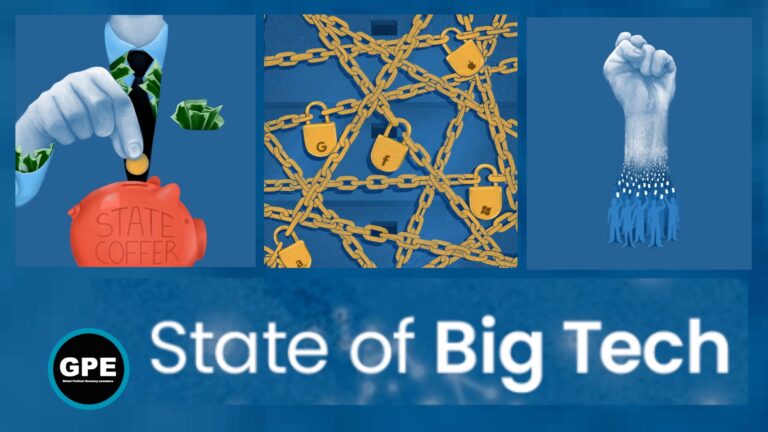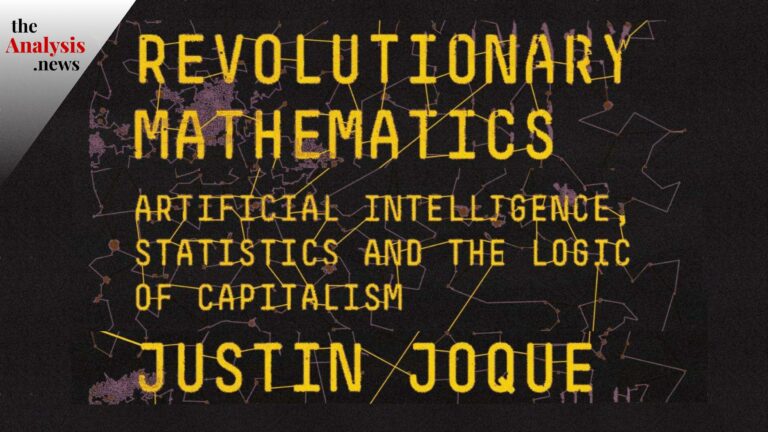Deborah James on why we need to pay attention to proposed changes in global rules. Big Tech works to ensure technology and world trade operate for their benefit post-COVID and beyond. GPENewsdocs.
Lynn Fries / GPEnewsdocs.com
TRANSCRIPT
LYNN FRIES: Hello and welcome. I’m Lynn Fries producer of Global Political Economy or GPEnewsdocs.
While most countries are focused on coping with COVID-19 and its aftermath, some rich countries are pursuing an expansionist free trade agenda at the World Trade Organization. One example of this in an effort underway to establish new rules globally for digital trade.
Digital Trade Rules: A Disastrous New Constitution for the Global Economy By and for Big Tech authored by Deborah James was the topic of a recent book launch and webinar. This report features highlights of of some key points contributed by Deborah James at the webinar. We go now to our featured clips.
DEBORAH JAMES: Thank you so much to the Rosa-Luxemburg Stiftung for publishing the paper and for organizing this seminar. And to Roland and to all my excellent co-panelists.
Welcome everyone and thank you for being here today. Just to say Our World Is Not For Sale is a global network of about 250 groups from the Global North and South from about 50 different countries. And we oppose the current model of corporate globalization. And we work together for a democratic, sustainable and fair multilateral trading system
So today I am going to share with you 3 major points. We’re here to talk about the digital trade rules that the Big Tech corporations are pushing in the WTO and in other forums. So I’m going to talk about the origin of the talks. Why are we having this discussion? I’ll give you a brief status update and then I’m going to focus on the implication of the rules.
So a couple of the basic points: Technology obviously can stimulate prosperity and development. It can bring us closer together and help build sustainable livelihoods. We are not anti-technology. But it can also constrain development. It can exacerbate inequalities. And it can destroy jobs and ways of life.
So whether countries, workers and consumers everywhere will benefit from new technology or whether the benefits will only accrue to a teeny tiny minority will be determined by the rules which set the playing field for how digitalization will evolve over time. And the important point is who is setting those rules.
Now, one of the best investments that corporations can make is to change the rules under which they operate so that they can extract greater profits from the economy while preventing their competitors from having a level playing field.
Now, powerful corporations have long used their surplus profits to invest in the undemocratic practice of trade policy-making. To use trade agreements to lock-in rules promoting their rights to make profits; while limiting government’s ability to regulate them in the public interest. Often through policies that they could not have advanced through democratic channels.
The World Trade Organization as we know is the global rule-making body on international trade. Big Tech and other corporations operating in transport, logistics, telecoms, finance, agribusiness, industrials, many other sectors are lobbying governments to use the WTO to liberalize the digitalization that is currently transforming the global economy. And particularly the governance of today’s most valuable resource which is data.
So what’s a quick status update? Well, in 2016 the Obama administration first proposals on digital trade in the WTO after hiring a corporate tech lobbyist under the guise of eCommerce talks in the WTO.
Proponents tried to get all 164 members to agree to a new mandate to negotiate binding rules on digital trade. And to permanently push aside the development agenda which has been pending since 1995. Okay.
But developing countries resisted the imposition of this new corporate agenda. And they blocked the new mandate at the last WTO Ministerial which was in Buenos Aires in December 2017.
However, a group of 76 countries launched talks among themselves to bring about a binding agreement on digital trade in the WTO. Now these nations are constantly lobbying and pressuring other developing countries that are not participating also to join their ranks.
Their aim is to conclude an agreement involving as many countries as possible. As well as to secure a mandate for talks among members of the WTO, all the members, by the time of the next Ministerial Conference. So that was supposed to occur last month but it’s been postponed at this time.
Now, one of the characteristics of the contemporary global economy is that while the productivity of workers and small businesses has increased over time obviously. Large corporations continually take more and more than their share. As I mentioned, they have used their surplus profits to intervene in the policy making process to design the market to distribute more of the gains to themselves.
Now, this process has been facilitated by digitalization. And the proposed rules are intended to lock in and accelerate that appropriation of the productivity of workers. So in reality, Big Tech has proposed the rules in order to consolidate its exploitative business model.
So what does it include? It includes gaining rights to access markets globally; they want to be around the world. They want to lock in deregulation. And they want to evade and prevent future regulation. They want to access an unlimited supply of cheap labor that has been stripped of its rights. They want to expand their power through monopolies. They want to avoid payment of taxes.
And now the newest aspect, they want to be able to extract and control personal, social and business data around the world. Data is the lifeblood of the digital economy. So whichever firms dominate artificial intelligence in their sectors by virtue of their big data set will dominate their industries.
Think about the fact that US-based Big Tech transnational corporations – Google, Apple, Facebook, Amazon and Microsoft – are now five of the six largest corporations in the world. Now the proponents are disguising their proposal in the Trojan Horse of being able to unleash development though the power of micro, small and medium enterprises using eCommerce.
These are not e-Commerce rules. They go far beyond e-Commerce and would result in the liberalization of all aspects of the economy. They really represent a new constitution; binding global rules on the entire digital economy written by Big Tech for its own benefit.
Now, these rules were already in the Trans Pacific Partnership. So it’s in the TPP. They also currently exist in the EU Japan FTA [Free Trade Agreement] and the U S Japan FTA and in the renegotiated NAFTA, the so called US-Mexico-Canada agreement
So if your country is a member of the TransPacific Partnership, you already have these rules.
If you’re part of USMCA, if you are EU with Japan, you already have them. But that doesn’t mean that they have to be exported to the whole world.
Because they are much harder to change if they are agreed in the WTO. Between the EU and Japan, you can change it when you finally decide that it makes no sense for your country. But we need to not have them in the WTO.
And we need to make a change. And we need to make sure that our activities that we’re advocating for – if they’re economic justice, racial justice, data privacy, whatever – that they include also paying attention to the rules that are being developed globally.
And we have lots of room for growth within Our World Is Not For Sale for more groups to join, to participate in this fight. We need to make a change.
And we need to get the rules that we need – worker rights, more taxation, anti-monopoly. And stop them from implementing the rules that they want which will really have such a devastating impact on our lives for the future.
Because once you get these rules in the WTO, forget ever changing them. That is a problem.
FRIES: We have to leave it there. Many thanks to the organizers & all participants of this event. And thank you for joining us in this episode of GPEnewsdocs reporting on Digital Trade Rules: A Disastrous New Constitution for the Global Economy By and For Big Tech. Authored by Deborah James, Director of International Programs at the Center for Economic and Policy Research (CEPR) and coordinator of the global Our World is Not For Sale (OWINFS) network.
END TRANSCRIPT
Deborah James is the Director of International Programs at the Center for Economic and Policy Research and coordinates the global Our World Is Not for Sale (OWINFS) network. Deborah James has over twenty years of expertise working on issues of trade and democratic global governance. At CEPR, her work focuses on the World Trade Organization, the International Monetary Fund, and US policy towards Latin America. Prior to CEPR, she was the Director of the WTO Program of Public Citizen’s Global Trade Watch, where she worked to inform civil society and governments worldwide about the potential impacts of the WTO’s proposed Doha Round expansion. She was also the Global Economy Director of Global Exchange, where she did similar work around the proposed Free Trade Area of the Americas.





